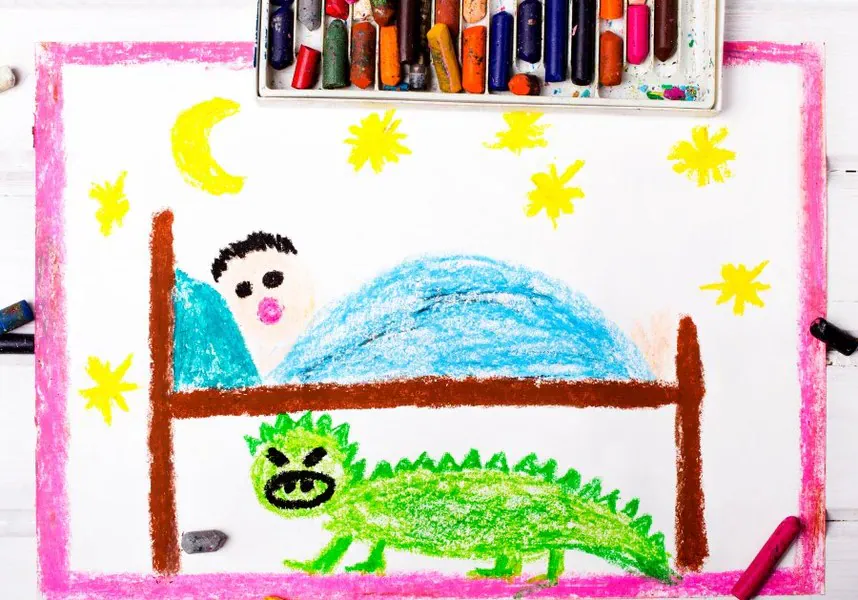Scary Dreams Or Night Terrors? How To Tell The Difference

Whether or not you remember hiding under the covers as a child, the fact is night time can be scary for young children. As infants, many children are rocked or fed until they fall asleep, and feel safe and comforted. They may sleep in a cot in or near their parents’ room.
But when it’s time for them to sleep by themselves, especially in a new bed or a different room, imagination and fear combined may lead to nightmares and bad dreams. Mysterious monsters, alien invaders or 'bad people' seem to feature strongly in the minds of young children.
HOW COMMON ARE THEY?
Over a third of all pre-schoolers will have a nightmare at least once every two weeks, and it’s most common in children aged between 3 and 5 years. Nightmares often happen very late at night or in the early morning.
We don’t know everything there is to know about the cause of nightmares, but they can occur because of unsettling events during the day or a disruption to your child’s normal sleeping routine. Scary stories, videos or TV shows, or loud, active play just before bedtime aren’t helpful.
If your child has the same nightmare over and over, it’s important to talk with them during the daytime to see if anything is worrying them.
CONTROL YOUR OWN ANXIETY
When a child wakes after a nightmare they may feel scared and upset, and this can also be distressing for parents. So it’s important you feel comfortable dealing with your child’s nightmares to avoid adding extra anxiety to the situation.
The idea is to be supportive and sympathetic, but not worried. Explain to them that what happens in a dream can’t hurt them, without getting into an argument about whether or not it was 'real' (as it will have seemed very real to them). You can also try things like a night light or learning relaxation techniques to practise with your child and use them as needed.
WHAT ABOUT 'NIGHT TERRORS?'
A far less common occurrence, affecting only around one in 30, is what is known as 'sleep terrors' or 'night terrors'. They mostly affect older toddlers and pre-schoolers, and sometimes even adults. The medical name is or pavor nocturnus and it’s considered a type of sleep disorder that may be linked to illness and fever, or a particularly busy or stressful day.
Unlike nightmares, night terrors usually happen in a different stage of sleep and so are more likely to occur during the first few hours after bedtime. And also unlike nightmares, they’re often more distressing for parents than the child!
Night terrors cause children to act as if they are suffering from an extremely frightening experience. Unlike a child who wakes from a nightmare, those experiencing night terrors don’t seem to be aware of their surroundings and often don’t seem to want to be comforted. They may also scream, have a rapid heartbeat, push away anyone trying to touch them, and have their eyes open but not be able to see (or perceive) anything around them. An episode can last anywhere from 60 seconds up to 20 minutes.
Despite these often alarming behaviours, the child is not dreaming and there’s no evidence to suggest that children who suffer from night terrors are experiencing any distress. Children who have a night terror episode usually don’t remember anything about it the next day, or even five minutes later once they’re awake. Once the night terror episode is finished, your child will usually go back to sleep and be fine.
Someone experiencing night terrors can be almost impossible to wake up. So if you do find your child experiencing an episode like this, there’s often not a lot you can do. Try speaking in a quiet, soothing voice or singing a familiar lullaby. Make sure your child can’t injure themselves, without putting yourself in harm’s way.
SHOULD I BE CONCERNED?
Recurring nightmares can be a sign of distress or deeper emotional issues. If you find your child is having a problem that you can’t work through, seek professional help.
If your child is having a night time episode in which they’re drooling or making stiff, jerky motions that look more like an epileptic fit, you should call a doctor. You should also seek professional help if:
- there’s more than one episode of night terrors in a 4-month period;
- they also have daytime fears; and/or
- the night terror episode occurs closer to morning than bedtime.
Dealing with nightmares or night terrors isn’t fun, but it’s all part of parenting and it’s a phase that won’t last forever. By knowing a little more about how to deal with problems like these, you’re already ahead of the game.

